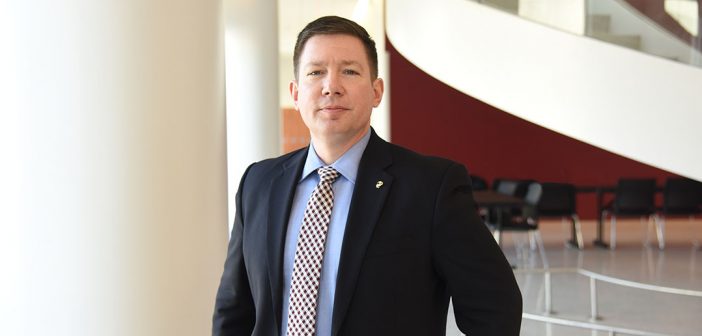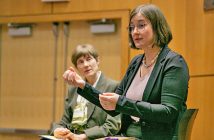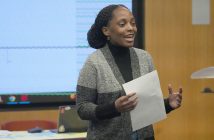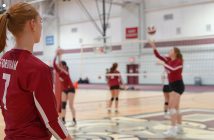In 2001 there were just 36 vets enrolled at Fordham.
Today there are more than 400, said Matthew Butler, PCS ’16, the newly appointed director of a campuswide veterans support program, Military and Veterans Affairs.
Butler, a former Marine and graduate of the School of Professional and Continuing Studies (PCS), is the first to fill the new role. In his new position, he will help coordinate veterans services on all three campuses—from writer’s workshops in Westchester to a Fleet Week Career Fair to be held on Memorial Day weekend at the Lincoln Center campus.
Butler said there are many reasons for the surge in veterans enrollment at the University, not the least of which was the Post 9/11 GI Bill and Fordham’s participation in the Yellow Ribbon Program. In addition, the University picks up the cost of fees not covered by the Department of Veterans Affairs.
As a student majoring in organizational leadership at the PCS, Butler said he detected a veteran’s theme when he read the story of Homer returning to Troy in the Odyssey.
“I was taken aback,” he said. “This is a guy that’s dealing with PTSD. His experience was life altering and couldn’t be ignored, and there were lots of examples where people didn’t understand him when he was trying to relate to them. It felt familiar.”
In his new role, Butler will bring all the veterans groups, whether for business students, law students, or alumni, under one umbrella organization, the Fordham Veterans Association. He hopes to create a unified veterans voice for all campuses.
Butler said he understands firsthand the difficulty of transitioning back to civilian life.
“When you join the military, you become part of something that is greater than yourself,” he said. “When you leave, it becomes about trying to find your way back to home. But it’s never the same.”
He believes that higher education is the best way forward for most veterans.
“Higher ed helps because it gives you the opportunity to solidify the skills you gained in the military.”
Most veterans think that what they did in the military is ordinary, he said, because so many of their colleagues performed similar functions. But operating equipment worth tens of millions of dollars is hardly an everyday experience for a person in their early twenties, nor is living overseas as many veterans do.
“When you combine that extraordinary experience and discipline with the resources from the University, like our corporate partners, then you can graduate someone that companies want to hire,” he said.
He noted that veterans bring a worldly perspective to their classroom peers, enriching class dialogue and creating greater understanding among veterans and civilians. This is true especially with regard to many misconceptions that compound transitioning to civilian life.
“There are so many stereotypes about vets, and a lack of understanding about what those serving actually do on a daily basis,” he said, noting that only 12 percent of veterans see combat. “PTSD is not specific just to combat; it happens in other situations, like transitioning to New York City from an Air Force base in Japan.
“It’s like Homer’s trip back to Troy,” he said. “He finds challenges along the way and even comes home to challenges. Ours is really an epic story of trying to come back home.”



